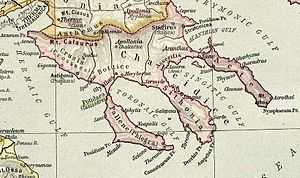Potidaea

Potidaea (/ˌpɒtɪˈdiːə/; Greek: Ποτίδαια, Potidaia) was a colony founded by the Corinthians around 600 BC in the narrowest point of the peninsula of Pallene, the westernmost of three peninsulas at the southern end of Chalcidice in northern Greece.
While besieged by the Persians in 479 BC, the town was saved by the earliest recorded tsunami in history.[1] Herodotus reports how the Persians attackers who tried to exploit an unusual retreat of the water were suddenly surprised by "a great flood-tide, higher, as the people of the place say, than any one of the many that had been before".[2]
During the Delian League conflicts occurred between Athens and Corinth. However, the Corinthians sent a supreme magistrate each year. Potidaea was inevitably involved in all of the conflicts between Athens and Corinth.
The people revolted against the Athenians in 432 BC, but it was besieged during the Peloponnesian War and taken in the Battle of Potidaea in 430 BC. The Athenians preserved the city until 404 BC, when it was passed into Chalcidice.
The Athenians retook the city in 363 BC, but in 356 BC Potidaea fell into the hands of Philip II of Macedon. Potidaea was destroyed and her territory handed to the Olynthians. Cassander built a city on the same site which was named Cassandreia, perhaps a sign that he intended it to be his capital. Cassandreia, much reduced in size, was used to establish a home for refugees from Asia Minor after the first world war, and at that time was renamed 'New Potidaea' (Nea Potidaia). A modern village nearby on the peninsula preserves the name of Cassandreia.
The modern settlement of Nea Potidea is near this ancient site.
In 2012 researchers from Aachen University announced that they had discovered evidence that supported the account of Herodotus and that the area should be included among Greek regions prone to tsunamis.[3]
In popular culture
- Gabrielle, Xena's sidekick in the television series Xena: Warrior Princess was born in Potidaea.
See also
- Delian League
- Peloponnesian Wars
References
- ↑ Smid, T. C.: "'Tsunamis' in Greek Literature", Greece & Rome, 2nd Ser., Vol. 17, No. 1 (April 1970), pp. 100-104 (102f.)
- ↑ Herodotus, The Histories, 8.129
- ↑ "Persian invaders of Greece 'did perish in tsunami'". BBC News. 20 April 2012. Retrieved 22 April 2012.
External links
- The Columbia Electronic Encyclopedia, 6th ed. 2012, Columbia University Press
- Greek Coinage of Potidaea
Coordinates: 40°12′N 23°20′E / 40.200°N 23.333°E